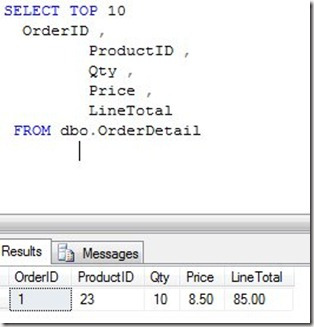I ran into an issue recently with a computed column, which I’ve rarely used, so I investigated them and wrote this short piece in computed columns, mostly as a reminder for me.
What’s a computed column?
You can read the BOL definition, but basically it is a column whose value is based on the values of other columns in a table. By having SQL Server perform the calculation, you prevent errors in the logic, or more likely, get around the chance that some application might forget to perform an update.
Let’s say I have this simple orderdetail table.
CREATE TABLE OrderDetail ( OrderID INT , ProductID INT , Qty INT , Price NUMERIC(10, 2) , LineTotal NUMERIC(10, 2) )
If I want to add a simple order to this table, I can do this:
INSERT dbo.OrderDetail ( OrderID , ProductID , Qty , Price , LineTotal ) VALUES ( 1 , -- OrderID - int 23 , -- ProductID - int 10 , -- Qty - int 8.50 , -- Price - numeric 85.00 -- LineTotal - numeric )
Note that in this case I have to perform the arithmetic of having the line total equal to the price multiplied by the quantity. The math is:
Linetotal = Qty * Price
85.00 = 10 * 8.50
However if I were to make a mistake in the arithmetic and insert $84 instead, or even $8.50, the SQL Server would not catch this.
Instead, I could use a trigger to calculate this value, but triggers seem to have other overhead and force me to maintain them. Instead I could use a computed column, I can save space by not persisting these columns, or I can persist them and index them if needed.
In my simple example, I could change my table to be this:
DROP TABLE dbo.OrderDetail go CREATE TABLE OrderDetail ( OrderID INT , ProductID INT , Qty INT , Price NUMERIC(10, 2) , LineTotal AS (Qty * Price) ) GO INSERT dbo.OrderDetail ( OrderID , ProductID , Qty , Price ) VALUES ( 1 , -- OrderID - int 23 , -- ProductID - int 10 , -- Qty - int 8.50 -- Price - numeric ) go
The LineTotal value is not stored in the table, which isn’t a big issue in this case. In fact, it means that I am saving a few bytes per row, which could translate into quite a few rows for this table (meaning less pages, less I/O, more chance of this remaining in the buffer pool, etc). The tradeoff is the computation is performed for this result set for every query. Which is better? It depends ![]()
Notice that I don’t have a value for my computed column in the insert statement, but the results from this version are the same as the previous one:
In fact, if I try the first insert above, which has the LineTotal in it, I get this error:
Msg 271, Level 16, State 1, Line 1
The column "LineTotal" cannot be modified because it is either a computed column or is the result of a UNION operator.
That’s a simple look at computed columns. Are they useful? I’ve never really worried about them, allowing either a stored procedure or the application to handle any logic like this. In general I dislike storing computations, even defined ones like this, but that’s me.
Use them if they fit your environment.
Filed under: Blog Tagged: sql server, syndicated, T-SQL
![]()



